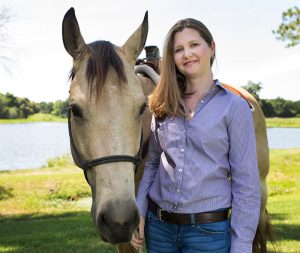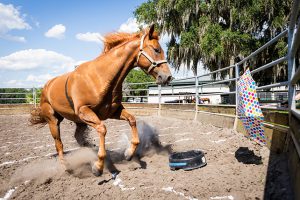 Though in many ways the value of a modern horse can be attributed to their physical performance, the horse’s athletic ability may still be less significant to a buyer than the horse’s personality, or temperament.
Though in many ways the value of a modern horse can be attributed to their physical performance, the horse’s athletic ability may still be less significant to a buyer than the horse’s personality, or temperament.
While performance and soundness are still important, Samantha Brooks, Associate Professor of Equine Physiology in the UF/IFAS Department of Animal Sciences, asserts that horse owners will often keep a horse around long past his performance days only because he had a dependable personality that made him useful in diverse situations. Whereas a talented horse’s value can decline if his temperament makes him difficult to handle or train.
“For the horse, it’s easy to argue that temperament is the most valuable economic trait,” Brooks said. “We work in very close proximity to our horses, potentially putting ourselves in danger should a horse prove to have an unsuitable temperament.”
The Brooks’ Equine Genetics Lab partners with Carissa Wickens, Assistant Professor and Extension Equine Specialist in the UF/IFAS Department of Animal Sciences to study the relationship between equine genetics and temperament. Their research utilizes the herd of horses managed by the animal sciences department, and involves students in undergraduate horse handling courses, to better understand how much of a horse’s temperament is due to their genes, and what parts are the result of environment and training.
The Brooks’ Lab is currently working on a project that assesses a part of horse temperament called a “spook” response, or how a horse reacts to something they don’t understand or that surprises them. This reaction is usually a startled jump sideways or a quick change of direction. In the wild, spooking allows a horse to flee predators and escape environmental threats. Around humans, this response can sometimes be dangerous.

In the study, each horse is prepared for the experiment by learning to be comfortable in a training pen and to walk on their own towards a bucket of feed. Students are critical at this stage, as they help each horse learn these tasks during their class-time training sessions. On test day, the horse is surprised with a colorful umbrella right next to their bucket of feed, eliciting a “spook”. The horse’s responses are recorded as behavioral data in videos, and physiological data like heart rate from wireless monitors.
After testing the horses at 6 months and 2 years of age, there is enough detail to compare the response scores to around 500,000 genetic markers across the genome of each horse. These markers help Brooks’ team measure how much of the test response can be attributed to genetics, and eventually, once a large enough sample size is collected, will enable them to map the precise locations in the genome containing the genes that modulate this unique aspect of temperament. In preliminary analyses, Ph.D. student Barclay Powell, has highlighted a strong genetic component to the initial fear reflex, or “spook” response. Yet what that horse chooses to do in the moments directly following the spook, is largely the result of training.
“Sure, any horse person who’s been around any length of time can show you the literal scars they’ve acquired as a result of less than ideal horse temperaments,” Brooks said. “Bites, kicks, broken bones… it’s all there. I’ve got my share. As a scientist, you can’t ask for a harder trait to measure; the industry does it by time and experience, which is very expensive and imprecise! In our research, I hope to tackle this challenge, providing faster and more accurate measures of what a horse might be best suited to do.”
Brooks believes that the results from this research will improve our understanding of startle and fear circuitry in the brain, a process important for handling stress and mental illness in both animals and humans. Additionally, she plans to produce diagnostic tests for heritable components of behavior in the horse that can be used in the selecting and breeding horses for a variety of tasks. Ultimately, improving the suitability of our horses will benefit the future success and safety of the horse industry.
Brooks has worked with Assistant Professors in the UF/IFAS Department of Animal Sciences; Carissa Wickens, and Emily Miller-Cushion; Andreas Keil, Professor of Psychology and Kim Sibille, Associate Professor in the UF Institute on Aging, over the course of this project. Doctoral student, Barclay Powell, has also been heavily involved as well as many undergraduate researchers, graduate students in the Brooks and Wickens labs, and all the students from the Weanling Handling and Horse Psychology and Training classes over the last 7 years.
For more on Samantha Brooks, Ph.D., visit her faculty profile. To learn more about the Brooks Equine Genetics Lab visit their website or find them on Facebook, Find more information about UF Animal Sciences on our website. Stay in touch with us on Facebook, Twitter, and Instagram.
 1
1
